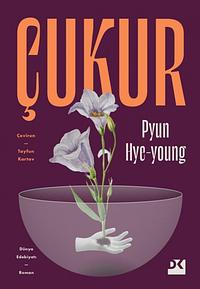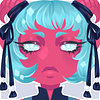Take a photo of a barcode or cover
dark
sad
slow-paced
Wasn't what I expected. I kept waiting for something to happen but it never came.
dark
slow-paced
Plot or Character Driven:
Character
Strong character development:
Complicated
Loveable characters:
No
Diverse cast of characters:
No
I picked this one up after finding it on a list of interesting international horror novels. The author is Korean, and the characters and setting are Korean as well, but the genre feel of the work is familiar--it's a surreal work of existential horror with a "contes cruelles" framework.
Contes cruelles, "tales of cruelty", are generally stories of bad things happening to bad people (or occasionally bad things happening to well-meaning but stupid people). The Hole definitely fits this description. It is a relentlessly cruel story of incredibly horrid disfigurement, disability and torture being inflicted on a man who it turns out (spoilers!) might actually deserve it, from the perspective of the woman deconstructing him.
It's rare to read something like this--a tale from a world without sympathy. There is no one I can root for here. Everyone in this novel is relentlessly repugnant, everyone is vapid and vicious, selfish and deceitful and petty. The suffering of the viewpoint character is so extreme that no vacuous crime of infidelity or deception that he could have committed in the course of his shitty marriage could possibly justify the way he is being tortured and humiliated as a bed-ridden victim after a car accident.
The book captures the subjective experience of being paralyzed and mutilated uncomfortably well, down to the last catheter. But some of the emotional pain and loss-of-control torture in the book is even more excruciating. The protagonist, who has lost portions of his jaw and face, can no longer speak and communicates mainly by blinking or awkward scribbles with the fingers of his left hand. He cannot defend himself when a malicious relative "speaks" for him--seizing his power of attorney, dismissing his caretaker and physical therapist, torturing and humiliating him by emptying his urine bag and exposing his naked, mutilated body to visiting friends while changing the catheter in his penis.
It is a horrific ordeal. And in the end, the author appears to suggest that it is justified, because the protagonist's wife was unhappy. He didn't beat or terrorize her, he just did the sad, stupid, mundane crap that middle-aged men do in every patriarchal society. Fucked around on her with students and colleagues. Belittled her dreams and goals, looked down on her, talked down to her--but what else IS marriage, to most straight men? Why do most men want to be married, if not to treat a woman this way?
I generally find reading books like this pointlessly uncomfortable. It's like walking around for hours in ugly shoes that rub blisters into my feet. I don't see the world the way these characters do, and while I know that people like this exist and suffer in the real world, I don't...actually give a fuck? I just want them to stay away from me.
Anyway. It's well-written for what it is. But I saw nothing here that made me want to read anything more from the same author.
Contes cruelles, "tales of cruelty", are generally stories of bad things happening to bad people (or occasionally bad things happening to well-meaning but stupid people). The Hole definitely fits this description. It is a relentlessly cruel story of incredibly horrid disfigurement, disability and torture being inflicted on a man who it turns out (spoilers!) might actually deserve it, from the perspective of the woman deconstructing him.
It's rare to read something like this--a tale from a world without sympathy. There is no one I can root for here. Everyone in this novel is relentlessly repugnant, everyone is vapid and vicious, selfish and deceitful and petty. The suffering of the viewpoint character is so extreme that no vacuous crime of infidelity or deception that he could have committed in the course of his shitty marriage could possibly justify the way he is being tortured and humiliated as a bed-ridden victim after a car accident.
The book captures the subjective experience of being paralyzed and mutilated uncomfortably well, down to the last catheter. But some of the emotional pain and loss-of-control torture in the book is even more excruciating. The protagonist, who has lost portions of his jaw and face, can no longer speak and communicates mainly by blinking or awkward scribbles with the fingers of his left hand. He cannot defend himself when a malicious relative "speaks" for him--seizing his power of attorney, dismissing his caretaker and physical therapist, torturing and humiliating him by emptying his urine bag and exposing his naked, mutilated body to visiting friends while changing the catheter in his penis.
It is a horrific ordeal. And in the end, the author appears to suggest that it is justified, because the protagonist's wife was unhappy. He didn't beat or terrorize her, he just did the sad, stupid, mundane crap that middle-aged men do in every patriarchal society. Fucked around on her with students and colleagues. Belittled her dreams and goals, looked down on her, talked down to her--but what else IS marriage, to most straight men? Why do most men want to be married, if not to treat a woman this way?
I generally find reading books like this pointlessly uncomfortable. It's like walking around for hours in ugly shoes that rub blisters into my feet. I don't see the world the way these characters do, and while I know that people like this exist and suffer in the real world, I don't...actually give a fuck? I just want them to stay away from me.
Anyway. It's well-written for what it is. But I saw nothing here that made me want to read anything more from the same author.
slow-paced
dark
reflective
tense
slow-paced
Plot or Character Driven:
Character
Strong character development:
Complicated
Loveable characters:
No
Diverse cast of characters:
No
Flaws of characters a main focus:
Yes
sadly, it was not what i was hoping for.
it felt a lot like misery and god how i hated that book (the hole is better tho, i mean i liked it more).
but meh i was expecting more suspense and although it felt claustrophobic here and there, i wanted more of that.
it was okay, but it left me with feelings of dissatisfaction.
i appreciated the format of the book, the holes that were getting bigger with each chapter. it was a nice detail. also, i loved that plants and vegetation were part of the story (i am a sucker for these hehe).
i might have to re-read it for a better understanding?? dunno if i will tho
it felt a lot like misery and god how i hated that book (the hole is better tho, i mean i liked it more).
but meh i was expecting more suspense and although it felt claustrophobic here and there, i wanted more of that.
it was okay, but it left me with feelings of dissatisfaction.
i appreciated the format of the book, the holes that were getting bigger with each chapter. it was a nice detail. also, i loved that plants and vegetation were part of the story (i am a sucker for these hehe).
i might have to re-read it for a better understanding?? dunno if i will tho
challenging
dark
tense
medium-paced
dark
emotional
mysterious
sad
slow-paced
Plot or Character Driven:
Character
Strong character development:
Complicated
Loveable characters:
No
Diverse cast of characters:
Yes
Flaws of characters a main focus:
Yes
challenging
dark
emotional
mysterious
reflective
sad
tense
medium-paced
Plot or Character Driven:
A mix
Strong character development:
Yes
Loveable characters:
Complicated
Diverse cast of characters:
No
Flaws of characters a main focus:
Yes
This book, marketed as a psychological thriller, has a strangely unique, distorted atmosphere which is a mix of grief, longing, repulsion, oppression, detachment and deep introspection. Hye-Young Pyun scatters her clues like slow brush strokes and at unexpected moments; yet her story still feels gripping.
She produces a well constructed plot which stresses the states of physical as well as psychological pain, defiance and delusion that the main character, Ogui, goes through.
My edition of this book is blurbed by a magazine which compares 'Le Jardin' to a "sophisticated version of Stephen King's 'Misery.'" Now, I would not say that 'Le Jardin' is more sophisticated than 'Misery' but that it is different, in terms of writing, plot and mood. Hye-Young Pyun drifts away from the grotesque and nightmarishly gruesome scenes of 'vengeful medical care' found in 'Misery;' she rather focuses, through a more realistic approach, on the constant medical assistance required by a person who's body is entirely paralysed and on the very negative repercussions of, even the tiniest, lack of support regarding this person's essential daily needs.
Moreover, Hye-Young Pyun shifts, throughout her book, the reader's attention from the abusive mother-in-law to the previously abusive Ogui; almost all of the characters become unreliable or flawed. There is also a great sensibility in the way that Hye-Young Pyun's characters are constructed; even though bitterness remains at the core of the novel.
The symbolic meanings surrounding the garden and the huge hole dug there by Ogui's mother-in-law brings in elements of alienation.
In short, 'Le Jardin' ('The Hole' in its English edition) is definitely worth a read.
She produces a well constructed plot which stresses the states of physical as well as psychological pain, defiance and delusion that the main character, Ogui, goes through.
My edition of this book is blurbed by a magazine which compares 'Le Jardin' to a "sophisticated version of Stephen King's 'Misery.'" Now, I would not say that 'Le Jardin' is more sophisticated than 'Misery' but that it is different, in terms of writing, plot and mood. Hye-Young Pyun drifts away from the grotesque and nightmarishly gruesome scenes of 'vengeful medical care' found in 'Misery;' she rather focuses, through a more realistic approach, on the constant medical assistance required by a person who's body is entirely paralysed and on the very negative repercussions of, even the tiniest, lack of support regarding this person's essential daily needs.
Moreover, Hye-Young Pyun shifts, throughout her book, the reader's attention from the abusive mother-in-law to the previously abusive Ogui; almost all of the characters become unreliable or flawed. There is also a great sensibility in the way that Hye-Young Pyun's characters are constructed; even though bitterness remains at the core of the novel.
The symbolic meanings surrounding the garden and the huge hole dug there by Ogui's mother-in-law brings in elements of alienation.
In short, 'Le Jardin' ('The Hole' in its English edition) is definitely worth a read.








